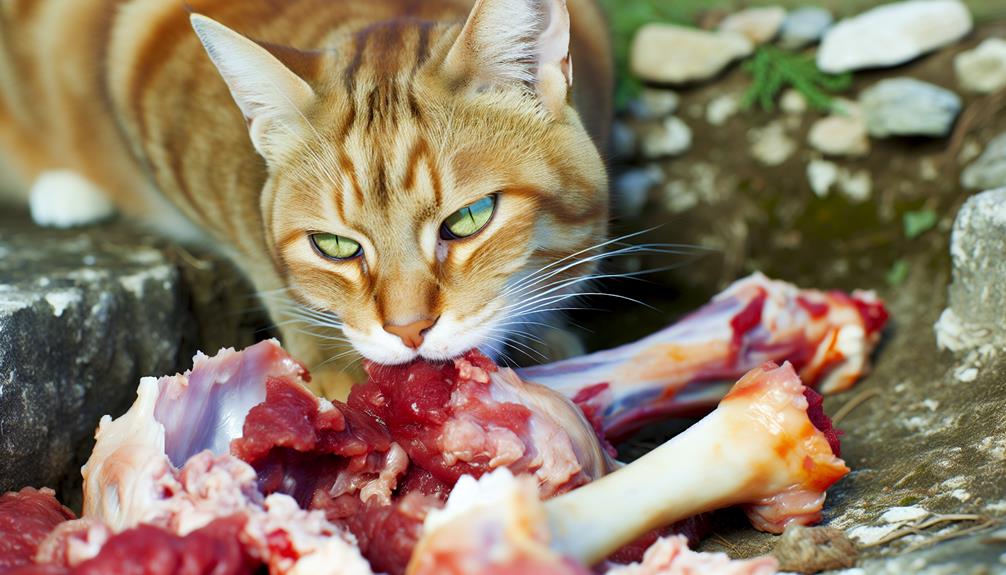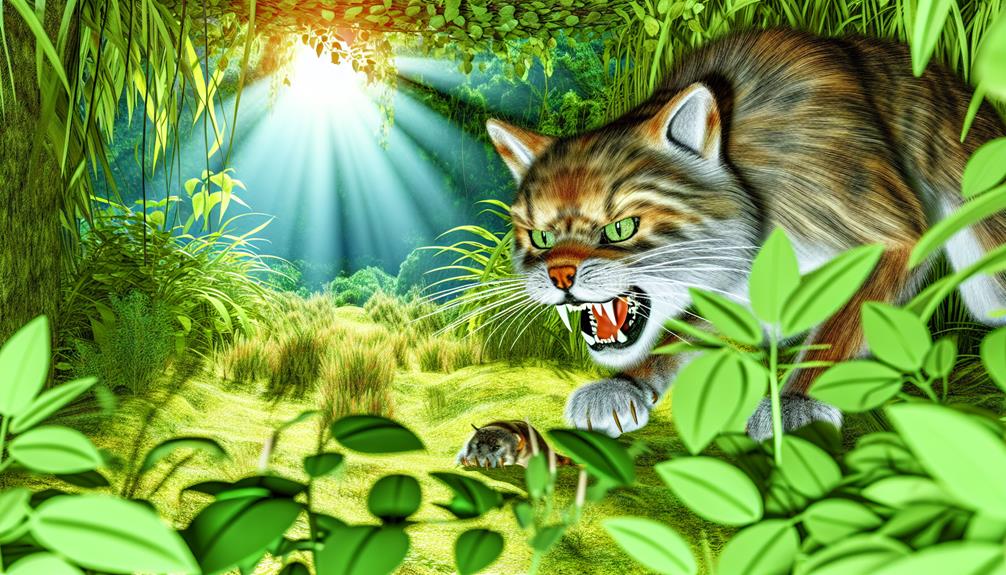Picture a sleek, agile cat, its sharp canines glinting as it effortlessly tears into a piece of meat. You might wonder if cats are true carnivores. Their physiology, from razor-edged teeth to digestive enzymes, seems tailored for a meat-centric diet. But does this mean they can't digest anything else, or are there exceptions? Let's explore the intricacies of feline nutrition and dispel some common myths surrounding their dietary needs.
Feline Anatomy and Physiology
When examining feline anatomy and physiology, you'll quickly see how evolution has meticulously crafted cats into obligate carnivores. Cats exhibit several specialized traits that align perfectly with a meat-based diet. Starting with feline teeth, their sharp, pointed canines and molars are designed to tear flesh rather than grind plant matter. This dental arrangement underscores their predatory nature and dietary preferences for meat.
The role of digestive enzymes is equally essential. Cats produce specific enzymes like proteases that efficiently break down animal proteins. Unlike omnivores, cats lack the enzyme amylase in their saliva, which is essential for carbohydrate digestion, further emphasizing their reliance on animal-based nutrients. This enzymatic profile highlights their metabolic processes geared towards a protein-rich diet.
Sensory adaptations also play a significant role in their carnivorous lifestyle. Cats have highly developed senses, particularly their night vision and acute sense of smell, which are essential for detecting prey. Their whiskers and acute hearing help them navigate and hunt in low-light conditions, making them effective nocturnal predators.
Hunting instincts are deeply ingrained in feline behavior. From a young age, cats exhibit stalking and pouncing behaviors, indicative of their natural predatory skills. These instincts are not just for survival but are also an essential part of their physical and mental well-being.
Understanding these anatomical and physiological traits provides a clear picture: cats are biologically and behaviorally tailored for a diet consisting primarily of meat. This intricate design by evolution underscores why their dietary preferences are so specific and why they thrive on a carnivorous diet.
Nutritional Requirements of Cats
Understanding the nutritional requirements of cats is fundamental to guaranteeing their health and longevity. Cats are obligate carnivores, meaning their diet must primarily consist of meat to meet their specific needs. Here's what you need to focus on:
- Protein Sources: Cats require a higher protein intake than many other animals. Their bodies are adapted to derive energy from protein rather than carbohydrates. Quality protein sources include poultry, fish, and beef. Confirm the cat food you choose lists a high-quality meat source as the first ingredient.
- Vitamin Requirements: Unlike humans, cats cannot synthesize certain essential nutrients, such as vitamin A, vitamin D, and taurine. These must be obtained through their diet. Deficiencies in these vitamins can lead to severe health issues like vision problems and heart disease. Taurine is particularly important as it supports cardiovascular health and vision.
- Hydration Needs: Cats have a low thirst drive and often don't drink enough water on their own. Wet cat food can help meet their hydration needs, as it contains around 70-80% moisture, compared to dry food's 10%. Adequate hydration is essential for preventing urinary tract infections and kidney disease.
- Dietary Supplements: In some cases, dietary supplements may be necessary to confirm your cat is getting all the nutrients they need. Supplements like omega-3 fatty acids can support skin and coat health, while probiotics can aid in digestive health. Always consult your veterinarian before adding any supplements to your cat's diet.
Evolutionary Background

Recognizing the specific nutritional needs of cats underscores their unique evolutionary path. Cats, or Felis catus, are obligate carnivores, a trait rooted deeply in their evolutionary history. Their feline ancestors, dating back millions of years, adapted to a diet primarily composed of animal flesh. This evolutionary trajectory has cemented their reliance on specific nutrients that are abundantly found in meat but scarce or absent in plant matter.
Evidence from paleontological studies suggests that early felids, the ancestors of modern cats, were adept hunters. Fossil records reveal that their physical adaptations, such as sharp retractable claws and keen night vision, were optimized for predation. These attributes were essential for survival in diverse habitats, from dense forests to arid savannas, where they hunted small to medium-sized prey.
Dietary adaptations in cats have resulted in a metabolism that heavily relies on protein as a primary energy source. Unlike omnivores or herbivores, cats have a limited ability to synthesize certain essential amino acids, such as taurine, and vitamins like niacin and vitamin A, from plant-based sources. This is a direct consequence of their evolutionary diet, which provided these nutrients in ample quantities through animal tissues.
Moreover, the feline digestive system has evolved to efficiently process high-protein, high-fat diets, but it's less capable of handling large amounts of carbohydrates. Enzymatic activity in their pancreas and liver reflects this specialization, further underscoring their carnivorous nature.
In essence, the evolutionary background of cats, shaped by their feline ancestors and specific dietary adaptations, has firmly established them as obligate carnivores. Understanding this history is vital for providing them with nutrition that aligns with their biological necessities.
Common Misconceptions
Despite the clear evidence supporting the obligate carnivorous nature of cats, several common misconceptions persist about their dietary needs. These feeding myths often stem from misunderstandings about cat behavior and physiology, leading to potentially harmful dietary choices. Let's address some of these misconceptions with evidence-based clarity.
- Cats Can Thrive on a Vegetarian Diet: This is one of the most persistent myths. Cats are obligate carnivores, meaning they require nutrients found only in animal tissues. Taurine, a crucial amino acid for cats, is absent in plant-based diets. Deficiency in taurine can lead to severe health issues, including heart failure and blindness.
- Cats Can Digest Carbohydrates Efficiently: Unlike humans and dogs, cats have a limited ability to digest and utilize carbohydrates. Their natural diet in the wild consists primarily of protein and fat from prey animals. High carbohydrate diets can lead to obesity and diabetes in cats, conditions that are becoming increasingly common due to inappropriate feeding practices.
- Milk is Good for Cats: While it's often depicted in media that cats love milk, many adult cats are lactose intolerant. Feeding them milk can result in gastrointestinal distress, including diarrhea and vomiting. It's critical to provide water as the primary liquid in their diet.
- Cats Can Self-Regulate Their Diet: Some people believe that cats will naturally choose the best food for themselves. However, domestic cats don't have the same instincts as their wild counterparts. They may overeat or choose nutritionally deficient foods if given free access.
Understanding these misconceptions helps guarantee cats receive an appropriate diet that supports their health and well-being.
Benefits of a Meat-Based Diet

Ideal feline health hinges on a diet rich in animal-derived nutrients. Cats, being obligate carnivores, have evolved to thrive on a meat-based diet. This type of diet provides essential health benefits that plant-based or mixed diets simply can't match. One of the primary reasons is the high protein content found in meat sources. Proteins from animals are complete, containing all the essential amino acids like taurine, which is essential for heart function, vision, and reproductive health in cats.
Moreover, meat-based diets furnish cats with important vitamins and minerals. For instance, Vitamin A in its preformed state, which is abundantly available in animal tissues, is significant for maintaining healthy skin and vision. Unlike humans and some other animals, cats can't convert beta-carotene from plant sources into Vitamin A. They also require arachidonic acid, a fatty acid found only in animal fats, necessary for maintaining skin health and a robust immune system.
Additionally, a meat-based diet supports ideal digestive health in cats. Felines have a shorter gastrointestinal tract compared to omnivores, making them less efficient at digesting plant material. Meat sources are more easily digestible, guaranteeing that your cat can absorb the maximum amount of nutrients without gastrointestinal distress.
Scientific studies support these claims, indicating that cats fed on a meat-based diet exhibit better overall health, lower incidences of obesity, and fewer urinary tract issues. Consequently, to guarantee your feline friend leads a healthy, energetic life, it's important to provide a diet primarily composed of high-quality meat sources.
Conclusion
In summary, understanding that cats are obligate carnivores is vital for their health. Their anatomy, from sharp teeth to digestive enzymes, and their nutritional needs, like taurine from animal sources, all scream "meat-eater." Don't fall for the misconception that they can thrive on plant-based diets; it's like trying to fit a square peg into a round hole. A meat-based diet guarantees they receive essential nutrients, supporting their well-being and longevity.
